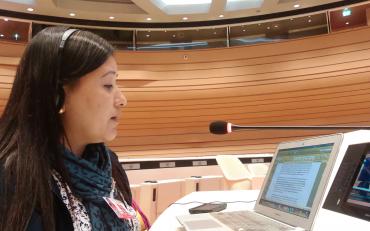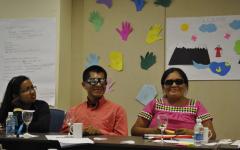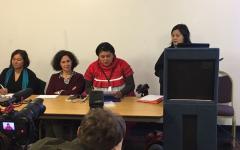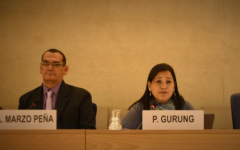Secretary General of Indigenous Persons with Disabilities Global Network and focal person of Asia, Pratima Gurung, from Nepal, participated at the 8th CRPD Committee pre-session, representing the Nepal Indigenous Disabled Association and National Indigenous Disabled women, of which she is the President.
“Nepal has submitted a CRPD report in 2015 and now there is the pre-session (4-9 September). During the discussion on Nepal on 4th september, 2017, there was a teleconference set to present the presentation from the organisations of persons with disabilities (DPOs) in Nepal and my presentation here in Geneva. I was representing DPOs of Nepal here in Geneva and it was good to be here to provide information on the situation of persons with disabilities on the ground to the commitee member and country Rapporteur of Nepal, Mr Prof. Kim Hyung Shik. My work is twofold: it comprehends the overall priority issues and perspective of persons with disabilities and the more specific one of the indigenous peoples with disabilities.
With my work, I am trying to raise the issues that we as person with disablity encounter every day in our communities to the national, regional and global levels because the issues and experiences on the ground have to be reflected at all levels. And that is why I am here in Geneva. It is pivotal for me to be here to do advocacy, lobbying and to try to incorporate as many issues of all persons with disabilities and other marginalized groups from developing and diverse countries like Nepal which the Committee is preparing to the State.
Being here is also very important to represent the Indigenous Persons with Disabilities Global Network, where we are trying to highlight on the recommendation that the committee has given to other States who have even more indigenous populations in their territories. And this time we are making our collective voice from national, region and global with list of issues and reports in the Committee so that the most vulnerable and underrepresented groups voices are reflected so other brothers and sisters in other parts will also be involved and engaged in the CRPD Committee process in coming days.
We are opening avenues to engage and ensure every one's human rights in this process. This is the first time that indigenous peoples presented a contribution to the CRPD Committee, and we are trying to make our voice audible so that the situation that indigenous peoples living in our country will be reflected and ways to work further will begin.”
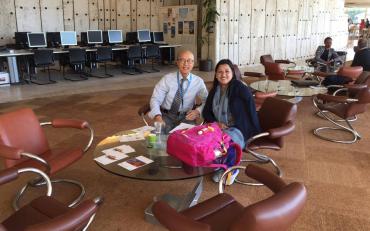
Nepal is a multilingual, multireligion, multiethnic with diverse geography. There are 59 ethnic and indigenous peoples which the state has officially recognized and yet more than 50 are yet to be recognized which represents more than 35% and persons with disabilities are 1.96% of the entire population. The majority of persons with disabilities are from indigenous communities living in rural and hilly areas, unaware about their rights, education, instutional system and CRPD.
“If we are not able to include the most marginalized groups facing multiple layers of discrimination like women, youth, indigenous peoples, persons wth disabilities who need special care and attention in the CRPD Committee processes, in the list of issues or in the recommendations we would fail to realize the slogan of ‘leaving no one behind’.”
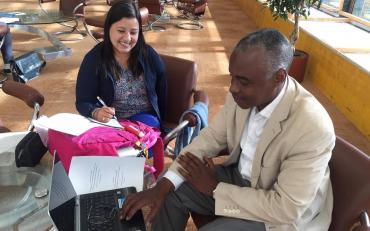
So it is important to us to have consultations and collective voices from the ground and incorporate all voices. So we are engaging at national level with all relevant stakeholders and also communicating at global level to make it more effective. It is a first process for Nepal and all the issues are equally important for us. The emerging issues like psychosocial, intellectual, autism, hemophlia, deaf and blind and multiple disability and others, intersectional discrimination related with women, indigenous peoples, youth, children, services relating with education, health and employment, emergencies and risk situation, disaggregated data and information, meaningful and effective participation are few of them which need to be discussed. Access to information and participation is equally important as most persons with disabilities from marginalized groups and groups who need special support are often left so they are not at the table to raise their issues and concerns happening at national and local level.
So their issues and concerns are properly included in the reports, in the documentation and in the global discussion. So our effort is to look at the gap and improve it collectively so that we can include in the documents.
After her work in the pre-session of the Committee on the Rights of Persons with Disabilities, Ms Gurung will be involved with actions related to technical capacity and development of the Global Network and training-related activities.
“This is the beginning of our collective journey from seven regions of the world and the journey has just started and we want all these stakeholders like the UN, UN agencies, the DPOs, the CRPD Committee, civil society organizations, families and other peoples in society to think to reach the most marginalized group and work together to make sure the underrepresented groups, such as indigenous persons with disabilities women, youth and children are not left behind.
The participation of Ms. Gurung is supported by the UN Voluntary Fund, with substantive support from IDA.
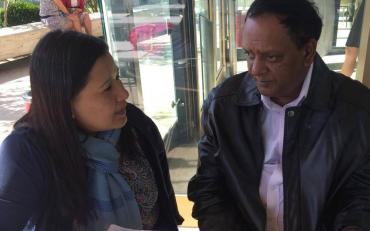
Photos:
Featured picture: Pratima Gurung speaking on major issues on persons with disabilities of Nepal, 4th September 2017;
Picture 1: Meeting with Mr Prof. Kim Hyung Shik, Country Rapporteur for Nepal, CRPD Committee member, 4th September 2017;
Picture 2: Meeting with Martin Babu, CRPD Committee member, 5th September 2017;
Picture 3: Meeting with Mr Coomara Pyandee, CRPD Committee member, 6th September 2017.
